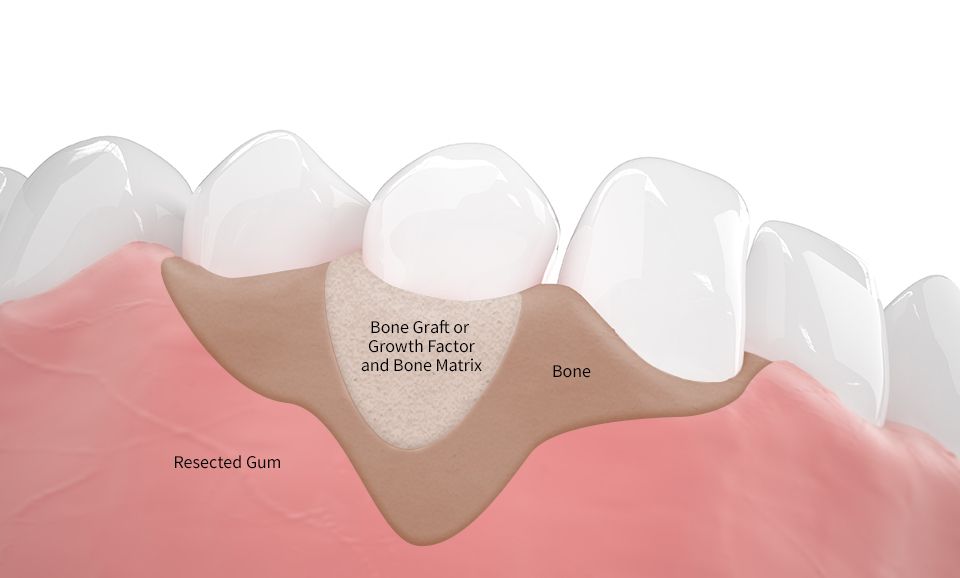Gingival Flap Surgery Can Restore Oral Health after Periodontitis
Gum disease can take a serious toll on your overall health and confidence by causing pronounced discomfort and tooth loss. For patients who do not experience sufficient relief from non-surgical methods, our Milwaukee, WI, practice can provide advanced solutions. Drs. Don and Cathleen Czaplicki perform gingival flap surgery to restore the health of your soft and hard tissue and help prevent future infection. During this gum grafting procedure, your dentist can eliminate infected soft tissue and directly treat compromised tooth roots and bone. With over two decades of experience, our doctors provide safe and effective dental services to preserve your oral health and alleviate your symptoms.

Are You a Candidate?
If you are struggling with advanced gum disease, you may be a candidate for flap surgery. Symptoms of periodontitis can include:
- Inflamed, bleeding gums
- Dental sensitivity
- Severe gum recession
- Loose teeth
- Tooth loss
- Persistent bad breath
During your appointment, Drs. Czaplicki can evaluate your oral health and check for signs of gum disease. If you do present with symptoms, your dentist may first recommend antibiotics and a more conservative, non-surgical procedure, such as scaling and root planing. However, if you do not respond to this treatment or the disease is too advanced, you may be a candidate for flap surgery. Your dentist will assess your overall health, including any underlying medical conditions, to determine whether flap surgery is right for you.
What to Expect During Your Procedure
Prior to your treatment, your dentist will remove all plaque and tartar from the tooth surface and gum line. Next, the dentist will administer a local anesthetic and may provide additional sedation to ensure your comfort. Your practitioner will then carefully place incisions in the gum and gently fold back the gum tissue to create a flap. Once the tooth roots and bone are accessible, the dentist can recontour the bone, remove infected tissue, and address any areas that have been damaged. To prevent further infection, your dentist will also smooth any rough areas on the tooth roots where bacteria can grow. If you have suffered from significant bone loss, a bone graft may be combined with flap surgery. Once the process is complete, Drs. Czaplicki will reposition your gum tissue, placing it securely around your dental roots. Finally, your dentist will close the incision with sutures and may place a periodontal pack or dressing to protect the surgical site.
Recovery
Drs. Czaplicki will review at-home care following surgery to ensure optimal results. It is common to experience some discomfort and swelling after flap surgery. Most pain can be managed with over-the-counter medications or any prescriptions we provide, and swelling can be reduced with cold compresses. Many patients are able to return to light activity within a week. While you are recovering, it is important to maintain proper oral hygiene. When brushing and flossing your teeth and gums, make sure to be extra gentle especially around the surgical site. Your practitioner may also recommend mouth rinses or prescribe antibiotics, depending upon your unique needs.
Gingival flap surgery can reduce your risk of tooth loss and help you to maintain a healthy, aesthetic smile and life.
The Benefits of Flap Surgery
There is no cure for gum disease. Nevertheless, flap surgery can help you to manage this condition. By removing bacteria and compromised tissue, your dentist can alleviate the symptoms of gum disease and help to prevent the spread of infection and other serious conditions, such as heart disease. As such, gingival flap surgery can reduce your risk of tooth loss and help you to maintain a healthy, aesthetic smile and life.
Learn More About Your Candidacy
If you are suffering from the symptoms of gum disease and past periodontal treatments have been unsuccessful, contact our office today by calling (414) 427-9090 or filling out our online form. After a thorough examination, our team can determine whether gingival flap surgery may be right for you.



